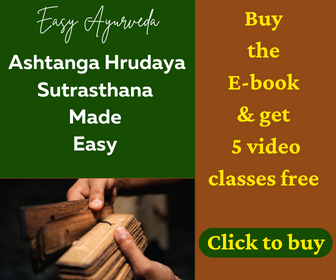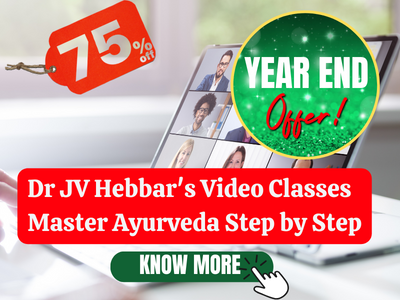Ayurvedic Daily Routine – Ashtanga Hrudaya Sutra Sthana Chapter 2
This is the second Chapter of Ashtanga Hrudaya Sutrasthana – Called Dinacharya – Ayurvedic daily routine. ‘Dina’ means daily, ‘Charya’ means – regimen. This chapter covers mental, speech and physical aspects of well being, that you should follow every day.
Table of Contents
Shloka Recitation Video
Waking up early in the morning
1. A healthy person should get up from bed at Brahmi Muhurtha, i.e., before dawn, or around 45 minutes before sun rise, around 5 – 6 am. Related article – How to wake up early in the morning?
Voiding urges, Brushing teeth
2-3 – Keeping in view, the condition of his body, the individual should pass urine and feces, and clean his teeth with any of the twigs of following herbs –
Arka (Calotropis procera),
Vata (Ficus benghalensis),
Khadira (Acacia catechu),
Karanja (Pongamia pinnata),
Kakubha (Terminalia arjuna).
To use the twig as tooth brush, the thickness of the twig should be approximately equal to the tip of one’s little finger. It should be 12 Angula in length. The tip of the twig should be chewed a little to make it like a brush. The twig should be of astringent, pungent and bitter tastes.
Contraindications for brushing of teeth
4. Danta Dhawana Nishedha – Who should not brush the teeth –
The following individuals should not brush their teeth – people suffering from indigestion, vomiting, dyspnoea, cough, fever, facial paralysis, excessive thirst, ulceration of mouth, heart disease, diseases of eyes, head and ears.
Collyrium application
5. Anjana – Collyrium
It is good to apply a special type of collyrium called Sauveera Anjana to the eyes. It should be applied daily. Rasanjana (aqueous extract of Berberis aristata), should be applied once in a week, to drain out Kapha (secretions) from the eyes.
Nasal drops, gargling
Navana and Gandusha – After collyrium application, a healthy person should do Navana (Nasya – Nasal instillation of drops). For this purpose, milk, herbal decoctions or herbal oils are usually used.
Following that, Gandusha – gargling with warm water, milk, herbal decoction or herbal oil should be done. Then Dhuma – inhalation of smoke from herbs and spices should be done, following which betel leaves should be chewed.
Contraindications for chewing betel leaves
7 – Contra indication for Tambula – betel leaf chewing – Those suffering from wounds, bleeding diseases, dryness, redness of eye, poisoning, repeated unconsciousness, intoxication and tuberculosis should avoid chewing betel leaf.
Oil massage
8-9. Abhyanga – oil massage
Abhyanga means massage. It should be done daily in the morning. It delays ageing, relieves tiredness and excess of Vata (aches and pains). It improves vision, nourishes body tissues, prolongs age, induces good sleep and improves skin tone and complexion. Massage should be specially done on ears, head and legs. Massage should be avoided when there is increase of Kapha in the body, soon after Shodhana (Panchakarma procedure) and when one is suffering from indigestion.
Physical exercise
10. Vyayama – exercise
Exercise brings about lightness, it improves work capacity, increases digestion power and burns fat. It brings good shape to the body. People with diseases originating from Vata and Pitta, children, elders, people with indigestion problems should not exercise. Exercise should be done till one’s half strength. Exercise should be done compulsorily by those having full strength and who take oily food stuff, from December to May. At the end of the exercise, one should undergo mild massage (pressing the body parts with mild to moderate pressure.)
Related article: Effects of exercise on health – Ayurvedic view
Excessive exercise adverse effects
11-14 Adverse effects of over-exercise: Excessive thirst, emaciation, severe dyspnoea (difficulty in breathing), bleeding disorders, exhaustion, feeling of debility (even without doing any work), cough, fever and vomiting are caused by excess of exercise.
Those who indulge in too much of exercise daily, who keep themselves awake till late nights regularly, who walk long distances regularly, who indulge in excessive sexual activities, too much of laughing, speaking, and such other strenuous activities, will perish, just as a lion perishes after vanquishing an elephant.
Powder massage
15. Udvartana –(powder – massage)
Udvartana is using powder for massage. It helps to calm down aggravated Kapha and to burn fat. Hence it is one of the therapies that many Ayurvedic centers offer for the treatment of obesity. Udvartana also brings in stability to body organs, improves strength and skin complexion.
Bathing
16-18 – Snana – Bathing
Bathing improves digestion, acts as aphrodisiac, prolongs life, increases enthusiasm and strength. It helps to get rid of dirt, waste products, sweat, tiredness, excessive thirst, burning sensation and microbes.
Pouring warm water over the body bestows strength, but the same over the head, results in loss of strength of the hair and eyes.
Related article: Hot water bath or cold water bath?
Bath is contra- indicated for those suffering from facial paralysis, diseases of the eyes, mouth and ears, diarrhoea, flatulence, rhinitis, indigestion and who have just taken food.
Good / righteous conduct
19. Sad Vritta – Good. healthy conduct:
Jeerne hitam mitam chaadyat – One should always eat, only after digestion of previous food, in limited quantity.
Na vegan neerayet – One should not induce natural urges forcefully. Example: urinating, when there is no urge to pass urine.
Na Vegito anya kaaryaha – One should immediately attend to natural urges, whenever they occur, without being busy in other activities.
Related article: Why I skipped my lunch today
One should undergo treatment for diseases as soon as possible.
Path of righteousness
20-21 Words of wisdom: Path of righteousness:
All the creatures seek happiness. There is no happiness, without righteousness. Hence all should follow the path of righteousness.
Friends should be served with affection and good deeds, whereas the others (wicked) should be kept at a distance.
The ten bad deeds
22. 10 types of bad deeds
Himsa (causing injury, torture etc.)
steya ( stealing, robbing),
anyathakama (unlawful sexual activity, desiring for others),
paisunya (abusive or harsh speech ),
parusha vachana (harsh speech)
Anruta vacana ( speaking untruth),
sambhinna alapa (speech causing separation, breaking of company),
vyapada (quarrel, intention of harming ),
abhidya (jealousy, not tolerating good of others) and
drgviparyaya ( finding fault, misunderstanding, faithlessness etc. with scriptures, elders etc)
These ten sins pertaining to the body, speech and mind should be avoided.
Of these ten, the first three are related to the body, next four- related to speech and last three – are related to the mind.
22-47
Those who have no means of livelihood, who are suffering from diseases and who are afflicted with grief should be helped.
Even the insects and ants should be seen with respect, similar to a physician, king and guests.
Beggars should not be disappointed, abused or objected.
One should be very helpful even to his foes, even though they are not helpful.
Sampat Vipatsu Eka manaaha: One should maintain a balanced mind both during calamity and prosperity.
One should not be envious towards wealth and happiness of others.
Kale bruyat – speak only on the right occasion.
Hitam bruyat – speak good words, be pleasant.
Mitam bruyat – speak little, as per necessity.
Do not argue, do not say untrue things.
Purva abhibhashi _ be the first to greet, to start a conversation
sumukhaha – have a smiling face
susheelaha – have good character
karuna, mrudu: – be courteous, be soft in speech and activity.
Na Eka sukhee – Do not be a person who likes to be alone always.
Na sarvata: vishrabdo – do not believe everything around you
Na shankhitaha – do not suspect everything around you
Do not instantly consider someone as your foe or that he is a foe of someone else.
Do not publicly talk about insults that you underwent,
Do not publicly talk about disaffection towards your king (boss/ master / senior, in today’s context)
Keeping in mind the nature of the people, one should deal with them in such a manner that it pleases them, and become well-versed in the art of adoring others.
The sense organs should neither be strained very much nor should they be fondled very much.
Do not engage yourself in things that are devoid of three pursuits (dharma (righteousness), artha, (wealth) and kama (pleasure) ): should carry on the occupation without going contrary to them (dharma and karma).
In all dealings (activities) one should adopt the middle means only and should avoid the extremes.
Personal hygiene
One should cut his hair, nails, and mustache regularly.
Keep feet, ears, nose, eyes, urethra and anus clean.
Take bath daily, put on scents and good dress which is not superfluous but is pleasant to look at.
Wear precious stones, potent hymns and herbs (kept inside amulets) on the body.
Walk holding an umbrella, putting on foot wear and looking straight to a distance of four arms length in front of you.
In case of urgent work at nights, one should go equipped with a baton, head- dress and an assistant.
One should not invade on the shade of a holy tree on which deities reside (or a Buddhist shrine), materials (or men) of worship, banner and unholy thing, heap of ash, husk and dirt, sand dunes, boulders, places of bali (offering sacrifices to Gods, demons etc.) and bathing.
One should not swim across rivers with arms, should not walk facing huge fire, should not travel in a risky boat, not climb a tree doubtful of strength; or ride on a vehicle, which is in bad condition.
One should not sneeze, laugh or yawn without covering his mouth.
One should not blow his nose (except for forcing out the dirty excretion); not scratch the ground without any reason, not do ugly movements of the parts of the body and sit on ones own heels for a long time.
One should stop the activities of the body, of speech and of the mind before getting exhausted; should not keep his knees above for a long period (keeping erect folded at the knee while sleeping or standing on the hands keeping the legs up etc. )
One should not reside on trees at night, meeting place of three roads, or places where people assemble for recreation, vicinity of a holy tree (or a Buddhist shrine), meeting place of four roads and temple (House of God). One should not reside even during daytime, in a place of slaughter, a forest, a haunted house or a burial ground.
No one should gaze at the sun for a long time, should not carry heavy weights on his head, not see continuously objects which are minute, shining, dirty and unpleasant.
One should not engage in selling, brewing, free distributing, or receiving of wine .
The person should avoid direct breeze, sunlight, dust, snow(dew), strong winds (whirlwind etc);
Should not sneeze, belch, cough, sleep, dine or copulate in improper postures,
Should avoid the shade of a scaffold, places hated by the king (or government), company of wild animals, biting animals and those with horns; of mean, wicked (uncivilized or very intelligent persons);
Avoid quarrel with good men;
Avoid indulging in food, sex, sleep, study and recapitulation at the time of meeting of the night and sunrise.
Avoid the food given by enemies, given during sacrificial ceremony, (that offered by large group of donors of different castes), that given by prostitutes and merchants;
One should not make sound with the body parts, mouth and nails, nor shake the hand and hairs; should not move in between two (receptacles of ) water, fire and the worshipful; should avoid the smoke of a cadaver; too much indulgence, in wine (drinking), believing and independence for (wicked) women.
For an intelligent person the world is a teacher, hence one should imitate the world after carefully considering their meaning and effects of such actions.
Compassion with all living beings, granting of gifts, controlling the activities of the body, speech and mind; feeling of selfishness in the interests of others (looking after the interest of others as his own) these are sufficient rules of good conduct.
He, who constantly thinks of how his day and night are passing and adopts the right way, will never become a victim of sorrow.
Thus was enumerated, in brief the rules of good conduct; he who adopts it will (surely) attain long life, health, wealth, reputation and also the eternal world.
Thus ends the chapter called Dinacarya, the second in Sutrasthana of Astanga Hrudaya composed by Srimad Vaghata, son of Sri Vaidyapati Simhagupta.













5 comments on “Ayurvedic Daily Routine – Ashtanga Hrudaya Sutra Sthana Chapter 2”
SUNITHA
SIR WHERE THE OTHER CHAPTERS ARE PLEASE INCLUDE THE OTHER CHAPTERS TOO FOR BAMS 1ST YEAR PLEASE
Dr JV Hebbar
I will write them soon. regards
vin
Sir, is chewing areca nut healthy or not healthy according to ayurveda?? Modern science says that one gets oral cancer.
Tamboolam is 100% safe though right??
vin
Is areca nut safe or no??
Amit
Indeed an exceptional & authentic work from DrHebber.